#IPE summer19
Explore tagged Tumblr posts
Text
By: Dustin Fletcher, Aerospace/Mechanical Engineering major, German minor
Program: Technische Universität Berlin (TUB)
Night has fallen on my second day in Germany, and I already have so many thoughts racing around my head.
First off: I have never flown before, so I got to experience my first flights and airport customs all by myself, which was a little scary and foreboding, but I was able to make it through. It’s kind of funny that I’ve never been on a plane before, considering that I’m planning on being an aero major specializing in planes! A couple things about the planes themselves actually really surprised me as well. I always thought that planes accelerated really slowly, and that when planes were driving around runways, they were building up speed to take off. I had absolutley NO idea just how fast planes were. It went from 5 mph to around 100 mph within seconds. Lastly, in my flight to Amsterdam, I felt like I was treated like a king with the way they were feeding us on the plane.
My German friend that I had in one my classes told me that there were a lot of wind farms all over Germany. I believed him, but didn’t quite understand just how many there were, so I thought it was hilarious that my very first sight of Germany was of a wind farm! (The white towers in the pic are the wind turbines)

Something else that I noticed immediately in Europe was the alcohol culture. On the plane ride from Amsterdam to Berlin, the air hostess set down a meal in front of me, and handed me a small bottle wine as part of. When I spent some time in Germany itself, some of the meals I bought had a beer included with it, as if a water replacement. And in some places, the beer is actually cheaper than the water! I was fairly surprised by this, as that would NEVER happen in the US, even if it was with people well over the age of 21. It seems to be a lot less taboo in Europe, since it’s such a large part of the culture.

I’ve noticed a ton of other differences from American life as well. One thing that’s very strange to me is the fact that water is not free. Anywhere you go, you need to purchase water. Vegetation here is also much different. Every road here seems to be grown over (but still well maintained) with sorts of vegetation, and it gives me the feeling that I want to explore. In stores, everything is so much cheaper than in America, and it’s all so much better! I am a huge fan of food, such as greek yogurt, bread, and strawberries. We went shopping at Aldi before we even checked into our housing, and all of the food was extremely cheap and tasty. There was an aisle for fresh bread, and I picked out a grainy sunflower encrusted bread, which is needless to say absolutely delicious, a section for “Obst und Gemüse, jeden Tag frisch” where I picked out a pallet of the best strawberries that I have ever seen and eaten, and I grabbed the best greek yogurt that I’ve ever had.
The fellow TUB participants living in Klüberstraße and I, hereby dubbed the Klüber Gübers, met up last night to hang out and meet each other. We then all met bright and early this morning to ride the trains into Berlin and do some sightseeing/eating. We visited many different places, I got to talk to a lot of German workers, and we ate a lot of food. Döner definitely lived up to the hype!
We all met up tonight as well, and we ordered food from a Chinese place. On the app that we order through, it said the delivery driver had arrived, and I went downstairs with one of the other TUB members to pick it up. We couldn’t find the delivery man, but there was a German lady that we had seen earlier. I asked her in German if she knew where delivery drivers dropped stuff off at. My friend then said something in English, so the lady tried to speak in English as well, but couldn’t really articulate what she was trying to say. She asked me how good my German was and I said that it was pretty good, so she talked to me in German. We ended up conversing for about 30 minutes, and at the end I asked her what she thought of my speaking, to which she said it was very good, although I do have a slight American accent. Since my goal is to be completely fluent by the end of this trip, I was very excited to hear that.
It’s now 2 am and I need to leave my apartment at 7:15 tomorrow to get to class on time, so I need to log off until later this week. Tschüß!
3 notes
·
View notes
Text
One Down, One to Go
Time has been going fast. Looking back, almost five weeks have passed. It doesn't feel like that much time has passed at all, it's really difficult to believe. But it was made apparent that this journey is ending as my Japanese class finished its last day.
We all knew from the beginning when it would end, but if I'm being honest, it still surprised me. On Friday, we had a written grammar test and then a speaking interview test on Tuesday. Neither of which was very difficult for me, but there were some who struggled more. I can thank my anime experience for the prior knowledge of the language. If you decide you want to learn a foreign language, taking a class abroad is a good idea that I'd recommend. In these few weeks, I've learned about the equivalent of nearly a whole semester at Michigan, but in this case, writing in Japanese (hiragana, katakana, kanji) was not required. If you want my advice on learning a new language, try not to relate it to English often and have fun with it, don't make it a chore to learn. Easier said than done, sure, but it's been done.
Anyways, on Wednesday, we had our final presentations. We had the choice of either doing a standard "tell us about something" speech solo or perform a skit with a partner; I chose the latter. Very few chose to do the speech solo, but they were still good. However, the skits were more enjoyable to watch. Overall, they were energetic and simply fun to watch. I'll always be more critical of my own performance, but according to my classmates, they found it enjoyable and easy to follow.
Then, as sudden as we started, the clock hit 11:30 and Japanese language class ended. As a farewell, our sensei, teacher, prepared a small sweets party for everyone in the NUSIP program.

We tried new and unique snacks, socialized with the other classes about how their final presentations were, and drank tea. It was a nice way to say goodbye and just a little sad. I'm not very sentimental, but thinking about how I'll likely not see my teachers again... yeah, a little sad.
And so, with one class down, just one more to go: the Automotive class. No bingo updates today, but I will be traveling to Tokyo as part of the program entails. As such, I won't have my computer. The last few updates will probably be back-to-back unfortunately. I do smell a bingo coming though, like a mountain in plain sight.
T-minus 8 days.
Lajlim Jesse Yang
Aerospace Engineering
Nagoya University Automotive Summer Program (NUSIP), Nagoya, Japan
1 note
·
View note
Text
A Darkness that must never be forgotten
By: Dustin Fletcher, Aerospace/Mechanical Engineering major, German minor
Program: Technische Universität Berlin (TUB)
My previous two posts have been very joyful and happy. However, this post will take a more somber tone. Before you begin reading this, I want you to remember a couple things; the following topics are can be very emotionally heavy, and parts of this might be difficult topics for some people to read. However, of all the posts I make during my exchange, this one is arguably the most important and I hope you read it all the way through.
Following the end of WW1, Germany was in shambles. The country as a whole needed to pay off the debt from the war, and this stemmed into riots, some demonstrations, and political vulnerability. As a result, it was very easy for people to find something, or someone, to assign the blame to. This is where Adolf Hitler comes in. As a young man and new politician, Hitler joined the DAP (Deutsche Arbeiterpartei -> German Worker’s Party), which later changed its name to the Nationalsozialistche Deutsche Arbeiterpartei (NSDAP), or Nazi for short. This party was strongly opposed to the democratic style government that Germany had adopted during the Weimar Republik. Hitler quickly gained popularity in this party, since he was a riveting speaker, in fact the best in the party. Hitler’s charismatic speeches of anti-Semitism and nationalism largely unified the people of Germany and drew large crowds towards his cause. Many people thought “This is exactly what our country needs, a strong leader who will speak his mind and get the job done!” Scary… You may be thinking, how could someone with such strong hate be elected as a leader? Excellent question, and I’m glad you’re asking it. You’d be surprised how often people say that phrase about very hateful people. Anyways, remember the thing about needing to assign blame to someone? That’s exactly what Hitler did. Rather than directly spreading anti-Semitic hate, Hitler spread it by saying that the Jews were the reason Germany lost the war, that they sabotaged the war efforts, that they’re the cause of all the political and social unrest in Germany at that time… It’s crazy what desperation can do to people’s moral compasses. In 1933 Hitler was appointed Chancellor and soon thereafter a bill was passed that stripped all power from the Reichstag. This effectively made Adolf Hitler the dictator of Germany, and thus das Dritte Reich (The Third Reich) was born.
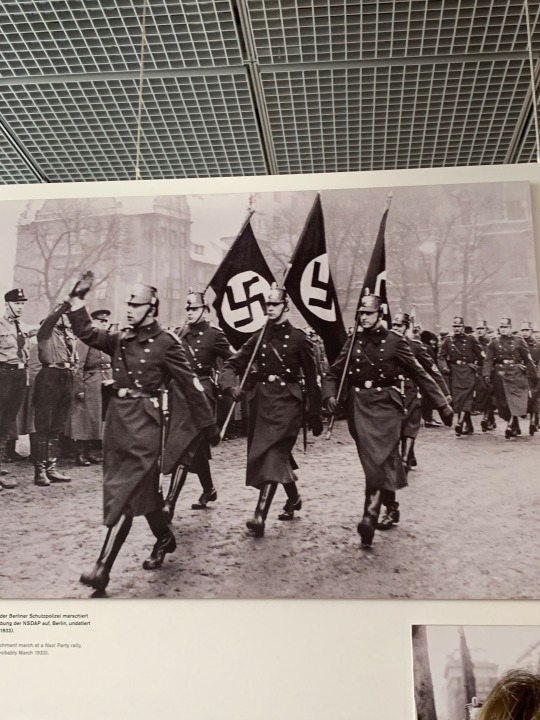
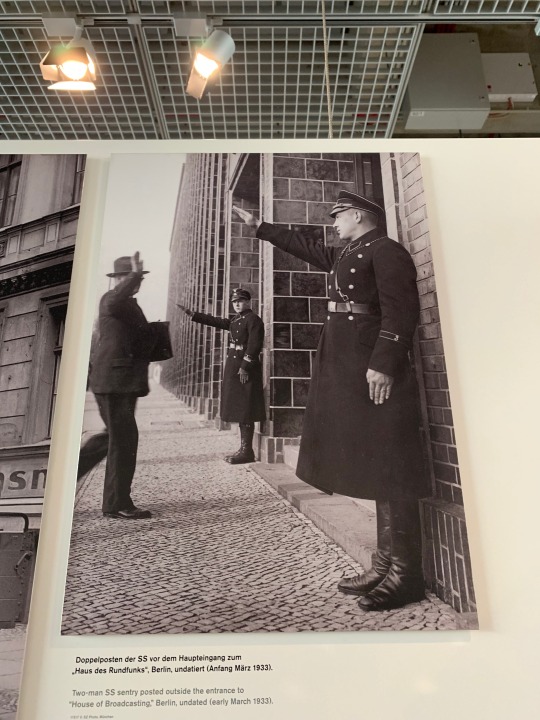
I won’t go into as much detail about the war itself, since that’s the part that everyone already knows, but I wanted to talk about the preceding events, as few people actually fully understand how Hitler came to power and how WW2 began. Hopefully this isn’t sounding like a history book, but you need the background knowledge to really feel the emotions.

As a group, we visited the “Deutsche Unterwelt”, which was a tour of one of the bunkers found in Berlin. During this tour, we got to learn a lot about events leading up to the war, as well as how the German government was able to mitigate panic or spread propaganda, which they used to ��brainwash” the public. Leading up to the war, Germany needed to start preparing, but the big question is, how do you get an entire country to prepare for a war that you are starting as an attempt to “purify” the world? Simple answer, you don’t. Instead, Hitler told Germany that other countries were preparing to wage war against them, and enforced mandatory “defense” preparations, such as practice air raids (callback to bunker we were in), manufacturing weapons, so on and so forth. The German government spread propaganda during the practice raids by having magazines that contained the Nazi ideology. But don’t forget the children! To make the air raids family friendly, the government so generously provided board games depicting war and Nazi ideals for the young’ns! Learning about this was extremely important for me, because it really helped me to fully understand how Hitler was able to get Germany fully onboard with his radical ideas. Most people think that the German people knew Hitler’s plan from the beginning, which makes it really easy to judge them for joining in at Hitler’s side. I know I definitely judged them, because I just couldn’t grasp how people would just so willingly torture and kill people. The reality is that it was a long, deliberate, and thought out process over a course of a decade where Hitler slowly convinced people to listen to him. Through these small things like slowly hiding Germany’s true intentions, to lying about the war, to feeding propaganda to children, it’s actually quite easy to understand how Hitler could manipulate the entire country. Some other things we were able to see were bathrooms, waiting areas, and the bunker rooms themselves. Sitting in a room with our tour group was already fairly crowded, and we were at about the maximum capacity for the bunker room. We were told that the bunkers were only designed to make the people feel safer, since the German government never thought bombs would reach Berlin, so they really couldn’t handle all of Berlin’s population. At the end of the war though, bombs started landing in Berlin, and so everyone that could fit in the bunker did. Imagine, 100 people sitting in a room. Now, imagine that the room was designed for 20 people. Now imagine that it’s unbearably hot, and people are using the bathroom right where they sit, and you have to stay there for hours. Sitting there thinking about that really made me appreciate all of the things I have, and how comfortable my life is in comparison. And finally, to drive the idea home of how terrible this all was, the people in the bunker were the lucky ones. Compared to the people in German concentration camps, the people in the bunker were living like royalty.
The thing that surprised me the most from the Unterwelt tour was the fact that the German post-war inhabitants tried to hide the past. Until around 1960, the survivors didn’t really talk about the events of WW2, and even when kids or young adults that didn’t live through the war asked about it, they would push the question aside and change the topic, and because of that, young Germans didn’t know what their country was responsible for. Eventually, people found out, and once they did, they decided that they couldn’t stand around and let the world nor Germany forget what they had done. This movement is what sparked the construction of many memorials all throughout Berlin, as well as the rest of the country.
While we’ve been here in Germany, we’ve had the privilege of visiting a couple of these memorials. So far, we’ve been able to see memorials such as the book burning memorial, Gestapo, Die Deutsche Unterwelt, the Jewish Victim memorial, the Neue Wache, and more. Each and every one of the memorials was very powerful, and all work in tandem to remind us of the past, so that we can never forget it.
The book burning memorial isn’t large, but the person who designed it did a very good job of getting its point across. In the middle of an empty courtyard surrounded by large buildings, including the Humboldt University, is a single plaque and a lone plastic window on the ground. The plaque basically says that when people burn books, it is only a prelude to them burning people as well. In the beginning of the Nazi reign, young Nazis ran into the University and grabbed any book that contained knowledge opposing their ideas and beliefs. They then brought them out to the courtyard, where they burned all of the books. Under the plastic window in the ground is a room filled with empty bookshelves that would contain the number of books that were burned. Looking at the empty bookshelves really helps to visualize just how much knowledge was lost, and it helps us to remember how the destruction of knowledge leads us down very dark paths.
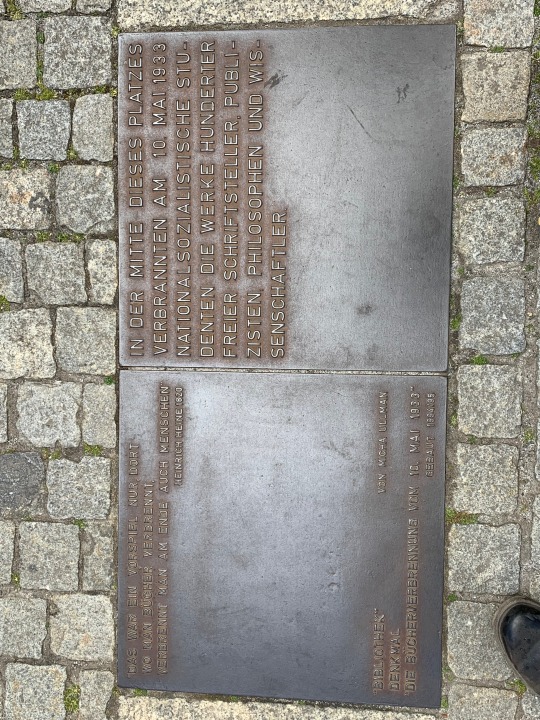
The Neue Wache is a roman-revival style building in the middle of Berlin. Inside is an almost empty room with a circular hole in the ceiling. Directly below this hole is a statue of a mother with her dead son. In front of the statue is an inscription on the floor that says “Den Opfern von Krieg und Gewaltherrschaft” which means “For the Victims of War and Dictatorship”. While I was there, I didn’t really understand the feeling that overcame me. I realized later after some reflection that the sensation was that of vulnerability. The statue is trapped in its place, unable to escape the weathering from the environment. In the winter, the statue is covered in snow, in the summer is baked in the heat, or drenched in a torrential downpour. The fate of the statue, much like that of the victims, is completely in the hands of the seemingly unwavering force that ails it. I can’t even come close to imagining the vulnerability and helplessness that the victims had felt, but the experience was powerful nonetheless.


Every memorial I’ve gone to has been very emotionally evoking, but the one that had the most powerful feeling for me was the Memorial to the Murdered Jews of Europe. The memorial is a grid of gray obelisks, and you can walk between them. As you come closer to the middle, the ground gradually gets lower and the obelisks get taller. I have absolutely no idea how to describe the feeling I felt while I was in the middle, but the closest I can come is an overwhelming feeling of loneliness and sadness together. It was one of the most powerful auras I’ve experienced in my life and was unlike anything I’d ever felt before. This is definitely a memorial that you need to see for yourself to find your own interpretation.
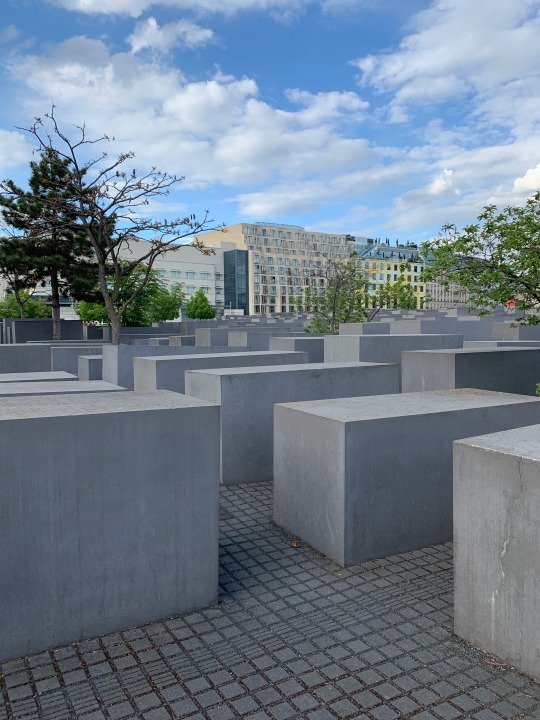


There are so many things I could talk about, but it would all be too much for a single blog post. I ~HIGHLY~ recommend taking some time to freshen up on the history of the war and post-war Germany and then take a trip to visit some of the memorials. Every single one is worth seeing, and I promise you that you’ll be glad you did it. The last “memorial” I’d like to talk about, and what I think is the most important, are the Stolpersteine. The first time that I had heard about Stolpersteine was in my 3rd year German class back in high school. Stolpersteine are golden bricks that are put into the sidewalk with the name of a Jewish holocaust victim, as well as their date of birth and date of death. When I first learned about them, I thought they were all gathered together in a single spot in Berlin. However, they aren’t all in one place, but rather spread all throughout Germany. Instead of looming monuments like most memorials, they’re just a single stone or small group of stones in the sidewalk around every corner, and you can spot one in the ground everywhere you go. What I think makes this idea so effective is the frequency at which you see them. Being able to see a Stolperstein anywhere you are really helps quantify the sheer number of people that fell victim to the Holocaust. Also, you see them almost every day, but still not quite often enough to start ignoring them, making them serve as a daily reminder to prevent us from forgetting the past. And as George Santayana said so well, “Wer sich seiner Vergangenheit nicht erinnert, ist dazu verdammt, sie zu wiederholen“ – He who does not remember his past is thereby damned to repeat it.
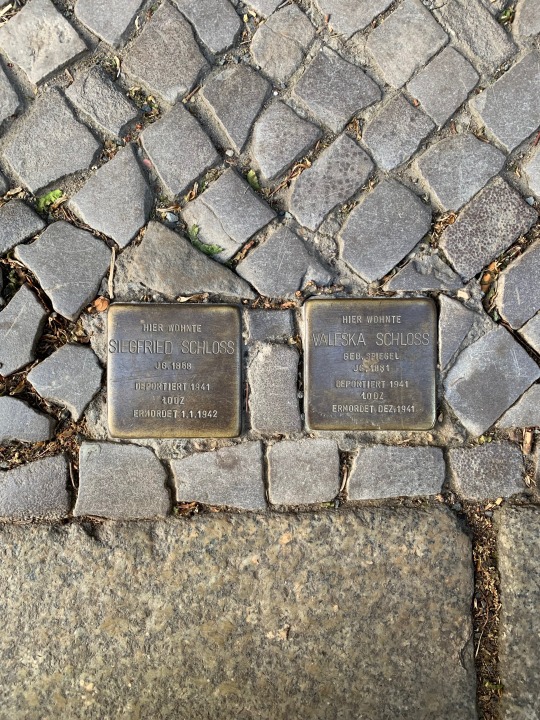
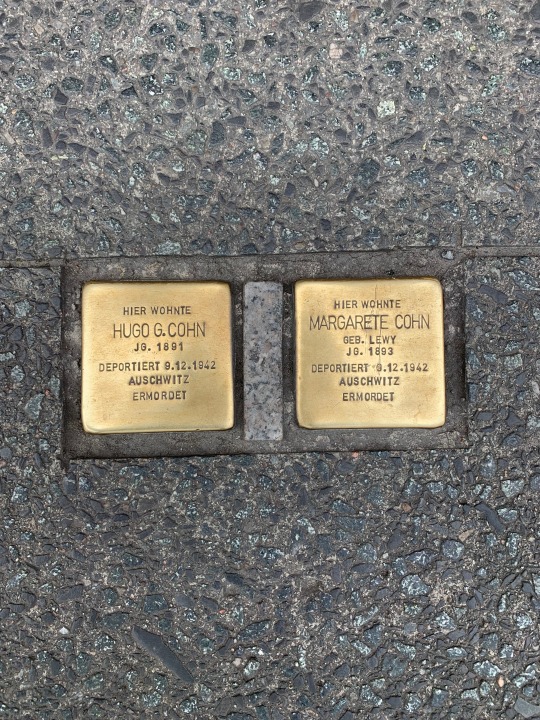
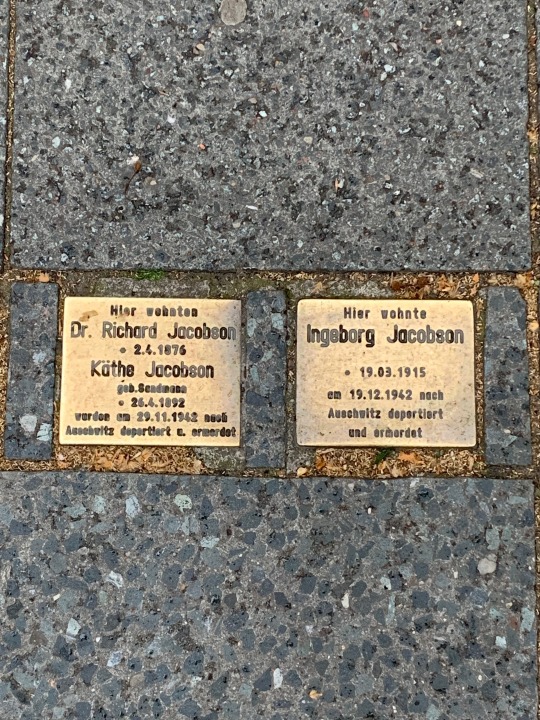
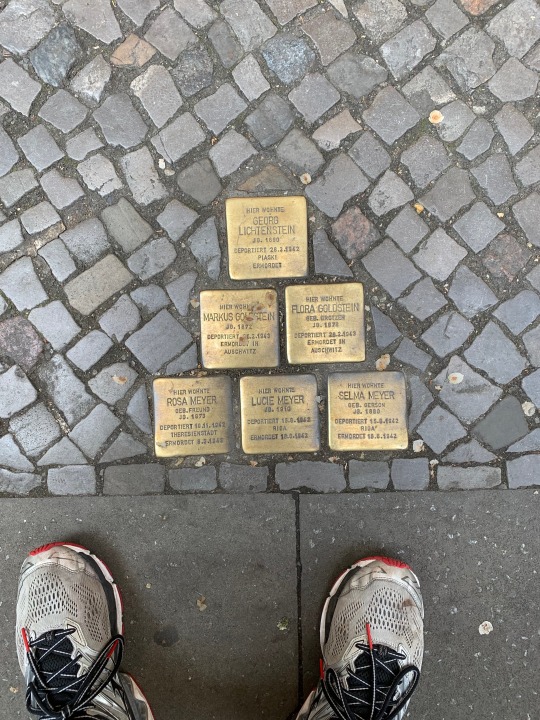
2 notes
·
View notes
Text
Au Revoir, A2
I’ve only spoken French ✨in the wild✨ once before in my life, as in, held a conversation in French with complete strangers. Let me tell you: this was significant departure from the textbook dialogues I had with fellow high school classmates that were more incoherent mumbles and nervous laughter than anything else.
But this time around, I was no longer a pretend waiter in a make-believe French café that only existed in my French book, instead, I was now a very real someone who had just gone through security at the Minneapolis-St. Paul airport. There was an item still on the conveyor belt from the family that went before me, and the conversation went a little something like this:
Me: Pardon ! (Excuse me!) Stranger: ? (?) Me: Est-ce que c’est votre ceinture ? (Is this your belt?) Stranger: Non. Merci (No, thanks) Me: De rien! (It’s nothing)
Even though this 5-second conversation happened about two years ago now, it’s come back to the forefront of my mind as I prepare for my travels out to France. What if I accidentally leave something behind somewhere in Charles de Gaulle, Lyon St-Exupéry, or any of the countless train stations I’ll be travelling through: Lyon’s Part-Dieu, Paris’s Gare de Lyon, Nice’s Gare de Nice Ville, or Marseille’s Gare de Marseille-Saint-Charles. Would I even know the French words for all of my belongings—if I lost anything, how would I be able to describe it?
I’ve been brushing up on as much French as I can, with the help of a friendly lime green owl (read as: Duolingo). There are several words in French that appear in English. You’re probably familiar with food such as “croissant”, “baguette”, “éclair”, etc. Some of these words translate in interesting ways: “croissant” translates to “crescent” alluding to the shape of a particularly buttery and flaky pastry...but croissant is also an adjective meaning “growing” / “increasing”… so if you’re a bakery that’s doing your best to translate your baked goods, you end up with this:

(courtesy of /u/NiceInformation on Reddit)
But I digress. In these last few days I’m spending state-side, I’ve been hastily wrapping up everything I can possibly take care of before I leave for 4 weeks. So far, I have...
Spent about 10 hours in my ceramics studio to get my work to a point where they’ll be stable for the time I’m gone (this means hastily finishing my pieces and bisque firing as many as I possibly can)
Cooked the remaining ingredients in my fridge into stir fry dishes or funky casseroles so I don’t have too many leftovers, and whatever I don’t end up using, I’ll pawn off onto my roommates.
Taken some graduation photos while the weather was still somewhat pleasant. Let me tell you: I have never been more skeptical of the Ann Arbor weather forecast before this past week. Apparently 40% rain meant torrential downpour scattered between light sprinkles, while 30% chance of rain meant nice pleasant sunshine, who knew.
Had two separate dreams where I had forgotten essential belongings for my trip—in one dream, I forgot my passport, outlet converters, an entire suitcase, and even somehow ended up at the wrong airport I would be departing from. In another, I managed to remember my suitcase but forgot my smaller duffle bag which I guess had important things in it.
Given my herb saplings to a friend or particularly benevolent coworker…because I definitely can’t trust my roommates with keeping them alive
Attempted to make ISO standard A (or maybe B?) paper sizes cooperate with the printers on campus without any proper PDF editing tool—it was hard, but I wanted to have a paper copy of my train tickets in case my phone died or something went wrong
(if you’re thinking “where’s the packing?”, it’s because I haven’t packed yet 🤫)
In the days following my spring commencement ceremony, I’ve been feeling such a chaotic mix of emotions. Relief, stress, dread, nostalgia, anticipation, anxiety, more stress, more dread, maybe even some excitement if I really try and look for it. I’ll worry about the whole “how am I going to be a real person???” thing when I get back from France. For now, I’m just feeling ready.
A+, (<- not my GPA, not even remotely close, but just a cute abbreviated form of “à plus”, aka “until later!”)
Christina Liu
Computer Science BSE
Entrepreneurship at INNOV@INSA
Lyon, France
2 notes
·
View notes
Text
Una Prueba de Vida
Now, the topic you’ve all been waiting for…FOOD!
Argentina has many different kinds of foods that are unique and popular that I have never heard of before. One thing that contributes to this is their meal schedule. Breakfast is very small and lunch is typically a little smaller than typical ones back in the U.S. As I’ve mentioned before, they have dinner very late—my homestay usually eats around 9:15-9:30—so in between lunch and dinner there is a snack (like a tea time) called merienda to hold everyone over. In turn, there are many cafes around that people eat at for a quick snack and a lot of their foods consist of little pastries or small bites to eat like empanadas.
One drink that Argentina is very well known for is something called mate (mah-tay). As a part of our program with CEA we had a mate tasting at a restaurant called Los Picasso. Since we were a big group we shared about six or seven cups full of different kinds of mate. Normally people just drink the general kind of mate, but at this restaurant we had a selection of Mates from the company Mate & Co. which had flavors like Tres Mentas, Lemon, Chocolate, etc.
We learned from our guide how to prepare the mate ourselves. For some background, mate comes from a plant called yerba which is grown in certain areas of Argentina and it is harvested and used to create the mate. To prepare it, first you pour the cup full of mate and then shake it to a diagonal angle so we could put the straw in without having to dig through the mate and it also provided an area to pour the hot water. After putting the straw in you would take a thermos of hot water and pour it into the slanted side of the herb where it would soak up starting at the bottom (be careful not to wet the entire top so the mate lasts longer). Mate is kind of like tea in a way that the hot water soaks up the plant and you drink from it, but it is different since it is not in a bag and is prepared differently.
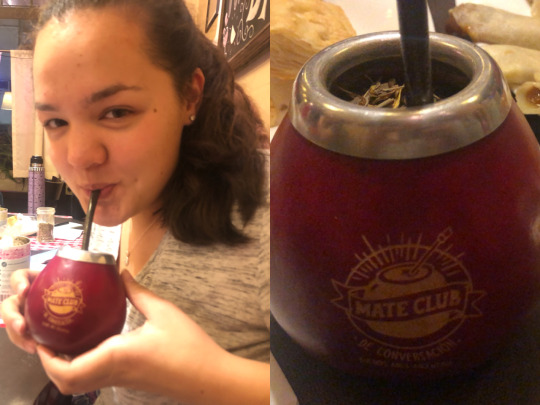
Me trying some mate!
According to our guide, the way mate works is that when there is a group of people the server would prepare the mate and then test the temperature themselves until it was ready to pass on to the first person to their right and they would drink until they passed it back to the server and this process would continue around the circle until someone says “thank you” meaning they do not want anymore. If someone new came, they would get the next cup of mate. Personally I wasn’t a huge fan of mate but apparently it is an acquired taste so maybe one day! (But I’m also not a coffee or tea drinker which doesn’t help.)
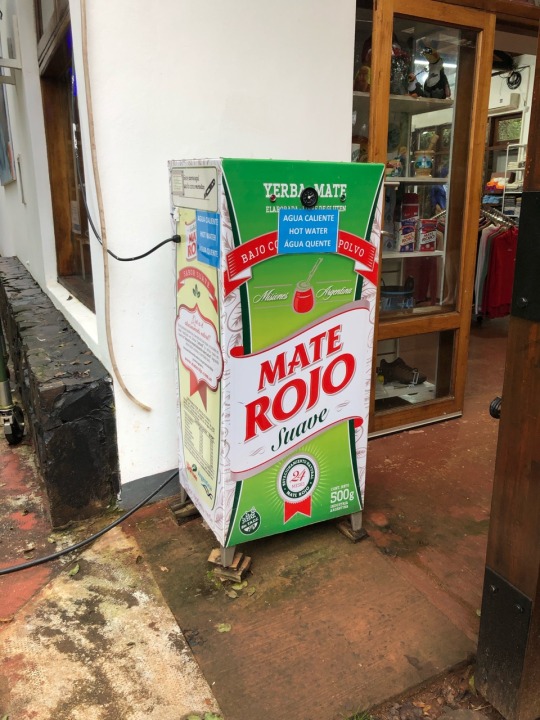
People all around Argentina drink mate, we even saw people carrying some on the trails around Iguazu. They have warm water stations for the cause.
They also had a lot of food at the tasting and they had very sweet snacks to our surprise.
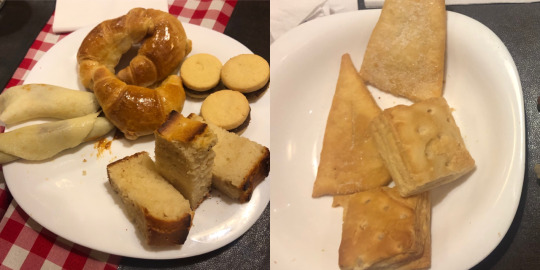
Medialunes, panquques, alfajores de dulce de leche, torta frita, and more!
Medialunes are croissant looking pastries that differ in the fact that they have a sweet layer of glaze. Alfajores are like little oreo cookies but the cookie part is more like a powdery sugar cookie and they are filled with dulce de leche. Panqueques are a kind of desert here that I learned about on accident. I thought I was getting a panCAKE, but got a panQUEQUE at a restaurant. They remind me of crepes because they are a thin layer of dough sort of like a crepe or tortilla and they can be filled with things like cream and dulce de leche.
Dulce de leche is also a HUGE Argentinian thing and I love it. Dulce de leche’s consistency is like a midpoint between caramel and peanut butter, not quite dripping but not solid either. It is a hard taste to describe but I would relate it to caramel with a little something extra, maybe more milk? Either way it is amazing and a new favorite dessert flavor of mine.
I’m personally a big cookies n cream flavor girl, but I expanded my horizons for this trip when I went to try ice cream and usually got a form of a dulce de leche flavor. I’ve heard that the best ice cream place in Buenos Aires is called “Rapanui” and we’ve also visited one called “Lucciano’s”. Both had amazing ice cream, but I found Rapanui’s ice cream a bit creamier—both still very good though.
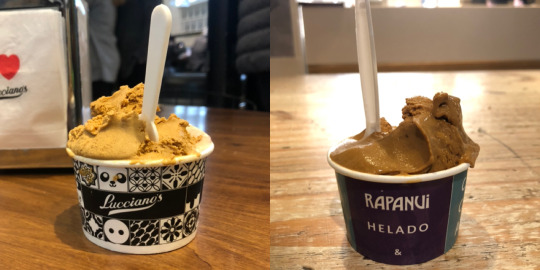
Ice cream from each place
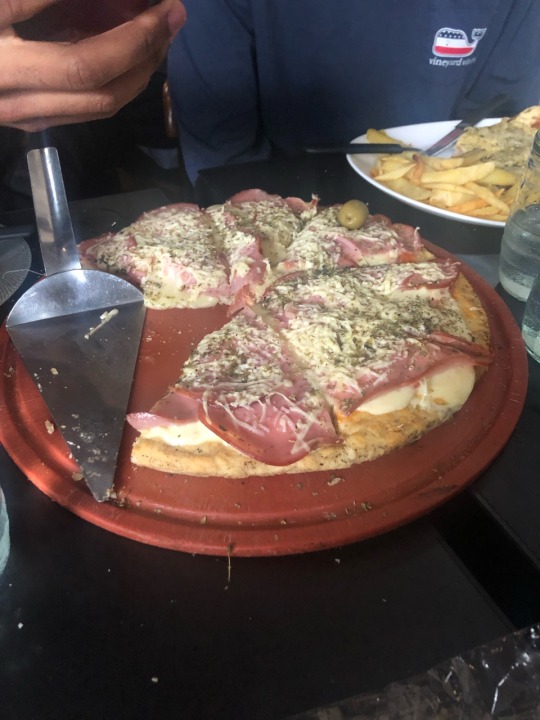
A fun fact is that they put olives in lots of places like on every pizza (despite the fact that I don’t think they belong there - in my opinion)
Now now, I know it would simply be a crime to not talk about the steaks but bear with me because I don’t know much about steaks in general besides being able to say whether they taste good or not.
Argentina is known for their beef and they eat a LOT of it. Los of restaurants have many different food options and many include meats whether that be a steak or a milanesa (breaded meat). I find that a popular kind is called the ojo de bife or bife de chorizo. Big meat restaurants here are called parillas (barbecue places) and have not disappointed me yet.
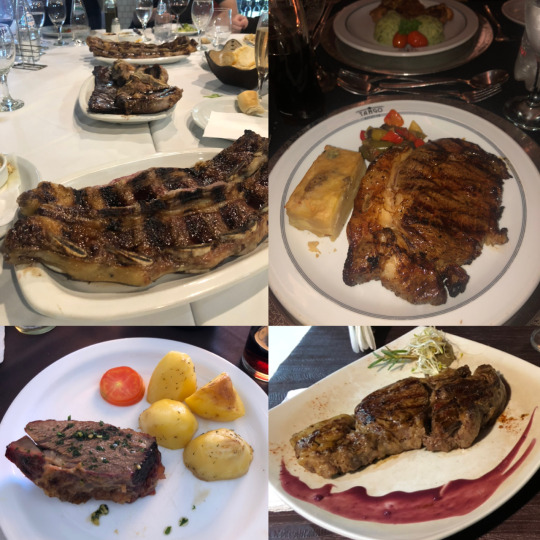
They do not lie about how good the beef is, just look at these!
You can also find different kind of meat sandwiches all over Buenos Aires and Argentina. Choripan (a sausage sandwich) is very popular and I got a Bandiola with great sauces at San Telmo one day.
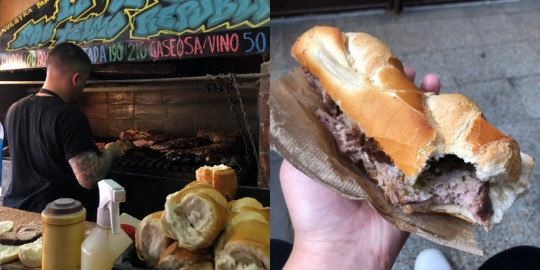
The bandiola and the small restaurant we got it from, cooked right on the grill for all to see
Another form of food you can find beef in is empanadas which I’ve talked about and shown before. Empanadas are filled pockets of deliciousness. Restaurants typically offer many kinds like ham and cheese, meat, chicken, corn, spinach, etc.
When we were in Salta we went to a town called Purmamarca for lunch where we ate at a restaurant the guide recommended to us. Here they served llama! I’ve never been one who has tried very exotic foods, but I figured while I am here I might as well try it. I got it in the form of a milanesa and found it oddly chewy at parts. Another thing I got in that tour was a ham and cheese tortilla that they sold at a rest stop on our way through the valley which was very good.

The llama, an empanad and the tortilla
More recently we went on a trip to Mendoza where we went on a tour that offered a five course meal or different things. The meal included things like squid, duck, trout, creamy rice in rabbit broth, and more! I’ve never had a five-course meal before but I was very happy with how it turned out. The portions were very small but for five courses I don’t know how I would’ve eaten it had it been normal meal proportions.
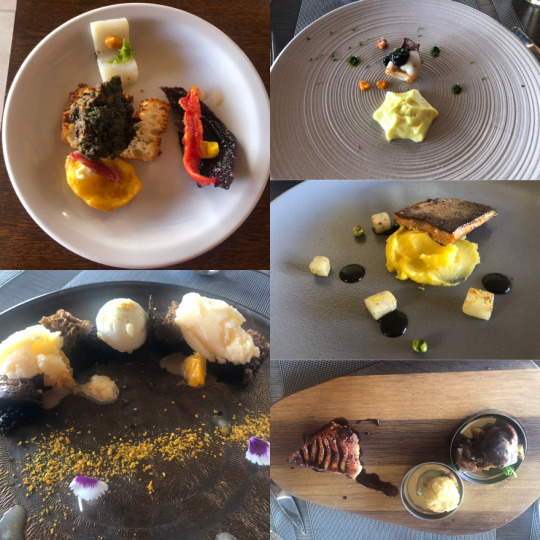
Our five courses!
Now that I’ve covered all of the major foods that I enjoyed I’m going to put a few more pictures of random foods I enjoyed!
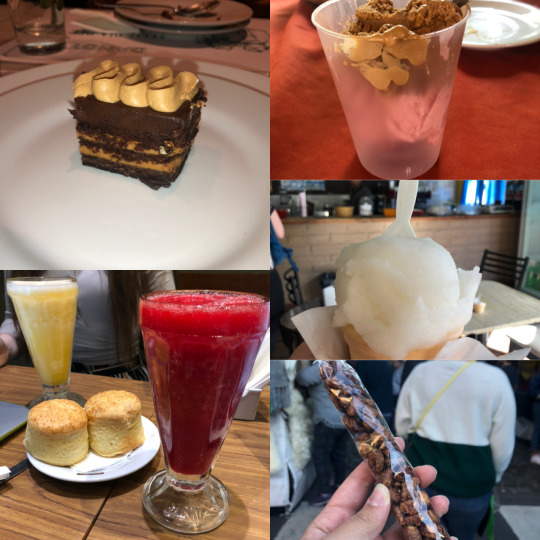
Yummmmmmm - forgot the name of some of these foods but they tasted good
Hope I haven’t made you too hungry!
See ya later!
———
Larissa Wermers
Mechanical Engineering
Engineering in Buenos Aires, Argentina
1 note
·
View note
Text
Les petits choses
The little things.
I've come across several little lifestyle differences in the time I've spent in Lyon (and briefly in Marseille and Nice as well) that I felt would be worth sharing. I’ve lived my entire life in the states, and there are some things I’ve gotten very used to that I realized I had taken for granted.
Crosswalks.
I've come across two very unexpected differences in the crosswalks and crosswalks signals I've seen:
The light to indicate pedestrians have the right of way switches immediately to the "No, don't cross now" sign. There's no blinking, there's no countdown, there's no kind of any advanced warning for "Hey, if you're walking, please stop now"
With the lights that I've seen in the States, I've noticed that some traffic lights in sync with crosswalks turn yellow with the countdown, whereas others don't turn yellow until after the countdown is over. As in, a pedestrian "Walk" signal for a road that runs east to west would, typically, be green at the same time as a green light for vehicular traffic along the road that also runs east to west. But when the countdown reaches 0, the traffic light would either be yellow, or red, and you never really know. This has made for some very confusing times where I couldn't actually tell if I could cross the road or not, but I would like to further research the effects of a countdown vs. an immediate "Don't Walk".
The lights for cross traffic (e.g. traffic lights for cars) aren't actually visible from where you're standing at the crosswalk, as in, they're "in front of" the crosswalk, from the perspective of the driver or tram conductor or what have you.
Almost every traffic light I’ve seen has been on a pole along the right-hand side of the road--they do drive on the right here!--and I’ve noticed that most actually have two lights: a slightly larger light on top of a pole, and a slightly smaller one a bit below it. I can’t really imagine what these could possibly be for...maybe one for lower, bicycle or motorcyclists, and a higher one for truck drivers?
After doing a bit of reading into this though, my frustrations have clouded my judgement on one important issue: by having the signals on the near side of the crosswalk, this prevents drivers from blocking the crosswalk or otherwise stopping much further than they should. I can name one intersection in particular in Ann Arbor where I’ve seen drivers often stop completely beyond the white line--Observatory and Geddes, the one not too far from Stockwell--oftentimes at the expense of a bus or truck being able to move through.
--- For the past couple months, I've been reading a bit more about accessibility (especially designing for those who have low vision and/or those who are hard of hearing, but there is obviously much more to differently abled people than just those traits), I've noticed a couple things here, especially at train stations, airports, and subway platforms.

This was along a train station platform in Lyon St. Exupery, guiding riders back from the trains through the doors to the main station hub

These were inside Gare St. Charles in Marseille, creating a pathway from one of the exterior doors to the stairs up to the main boarding/waiting area of the train/bus station.
They're for people with low vision or who otherwise would rely on a white cane more than their eyesight when walking around, and while some people I've met have argued that France isn't accessible at all, I do want to commend these little details in these spaces. The trams I've used have had visual and auditory indicators for the tram's next stop, lights and sounds for for when the train's doors are about to close or open, etc.
I’ve seen little bumps on sidewalks back at home, especially when the pavement slopes down toward a crosswalk, but I have yet to seen such a thorough implementation of other textured pavement patterns back at home. One thing I found interesting though: I have yet to see any braille.
--- And speaking of accessibility, I've yet to see anyone using under-the-shoulder crutches that seem so common back at home. More often than not, I'd had seen forearm crutches, like the ones on the right of this diagram here:

Picture credits to this article on Walkeasy, where you can also read more about the (physiological, stigma, and cultural) differences between the two styles: https://walkeasy.com/blog/walkeasy/forearm-vs-underarm-crutches
There was an interesting line from this article as well:
“Short-term users [in the US] perceive forearm crutches as being used only by those with a long-term physical challenge, hence want to avoid the stigma — the exact opposite perception exists in most other countries.”
This was true for me, the first time I saw other students on campus using a forearm crutch, I figured they must have had some really serious long-term injury, but I soon I realized that they were simply dealing with an injured ankle or something a bit more manageable than that.
a+, Christina Computer Science Entrepreneurship with INNOV@INSA Lyon, France
P.S. One more little thing! I had talked a lot about accessibility and a11y-related topics, but onto sustainability: since writing my last post that briefly covered this topic, I had noticed a couple other things around campus and in everyday life. There’s a recycling container for batteries right by the main dining hall on campus...

...a recycling... container of some sort... for markers and other plastic writing utensils, located conveniently by one of the bathrooms in the library

...and even a little message on my own toothpaste tube that says “Remember to turn off the water while brushing”. I think these serve as friendly (but perhaps also slightly self-contradicting) reminders to be conscious of the small, mundane parts of our everyday lives.
1 note
·
View note
Text
Getting started
Spanish Language, Culture & Industry in San Sebastian, Spain
Hi everyone! My name is Anastasia, but you can call me Ana. I’m a rising sophomore studying Computer Science Engineering, and I’m so excited to spend the next six weeks in Pamplona and San Sebastian, Spain! During our program, 12 other Michigan students and I will tour several companies to learn about Spanish industry, and we will all take a Spanish class and one special topics class. As soon as we arrive, we’ll start our three-week Spanish Language and Culture section in Pamplona, joining the spring session’s 15-ish students.
Right now I’m in the Salt Lake City airport, waiting to take off for Amsterdam on my way to Bilbao, Spain. I have spent the past few days in the Utah desert with Michigan Mars Rover Team for our international competition, and I’m enjoying my last views of the gorgeous mountains before liftoff (the flat suburbs of my hometown in Farmington, Michigan just can’t hold up to these). Thankfully, I have another adventure starting soon.

SLC has a great view of Salt Lake City’s Rockies, which are more striking in person than they seem in this photo. (What can I say, you had to be there.)

The desert and hills of The Middle of Nowhere, Utah, where our Mars Rover competition is hosted, will prove to be a stark contrast to the city environment of Pamplona and the beaches of San Sebastian. (Photo Credit: Minna He, Michigan Mars Rover Team)
I’m looking forward to getting to know my group, whom I already think of as “my team”, and exploring the local areas while pushing myself to grow. I've never been immersed in a different culture and language as much as I will be in San Sebastian and Pamplona on this trip, but I can’t wait to see how much my (virtually nonexistent) Spanish improves in that environment. Although I know I'll likely embarrass myself a little by speaking with locals to practice, I'm entirely ready to take that risk to gain the huge payoff.
I’ll be updating this blog twice weekly about our trip’s classes and experiences, and I’m thrilled to share this adventure with you all!
Ana Warner Computer Science ‘22 Spanish Language, Culture & Industry in San Sebastian, Spain
1 note
·
View note
Text
Halfway through
Our first week and a half of class flew by, and we're officially halfway through our program! I haven't mentioned a single word about our curriculum, so I'll get right on that.
For this particular program, INNOV@INSA, we have two different "tracks" -- one that focuses on project management, and another that focuses on building IoT devices (read as: arduinos with a bunch of sensors and bluetooth communication devices slapped onto it.) I was really torn between the two tracks, but I eventually chose the IoT one.
We've mostly had our IoT class every morning from 9am-12pm, which has usually been just a lecture. In the 8 days of class we've had so far, we've had 7 different professors, which has made for an interesting classroom experience. Some of the lectures we've had so far have resembled the entirety of 370 squished into a 3-hour lecture--we blazed through all of the components of a CPU, calculated the power consumption of a given sensor in various states of activity, and we've learned about different properties of networks and network signals.

We were recently given an Arduino Uno to toy around with, and we were encouraged to travel around campus and Lyon to collect data with the various sensors that were soldered onto it.

A couple of our lectures have been in this room, which is already decked out in a bunch of sensors, but I don't think we're allowed to use any of this data for our own project :(
...
In addition to our technical class, we're all enrolled in a French language class, a cross-cultural awareness class, and then a class that focuses on the industry and society in and around Lyon.
I've really enjoyed our French class so far, I was initially worried as it is our only class taught in French (which makes sense, as the best way to really learn a language is to hear and speak it), but our professor has taken a very creative approach to some of our lessons. Some of us were more novice speakers while one student has French-speaking family members and is almost fluent. During our first class, our professor roughly gauged our vocabulary by asking us to pretend we were parents trying to pacify our imaginary toddler's never-ending curiosity.
So a dialogue would go like:
"Hey papa, why are bridges suspended over rivers?' "To let boats pass underneath them." "Hey mama, why do old people lose their hair?" "Because being bald is fashionable"
and so on and so forth.
...
Our cross-cultural class also had a really interesting first day, the professor presented a generic stock photo that I'm having a lot of trouble finding, so imagine this:
A person is sitting in what looks like a chair with an attached desk inside a room with other similar types of chairs. No one else is in the frame, and on the desk are a pile of papers, a pair of eyeglasses, and the person's gaze is directed downward, presumably at a phone in their hands.
Our professor asked us to describe the scene. Some students stated more objective facts ("she is sitting in a chair", "she's looking at her phone", "she's inside a building", etc.) while others stated more subjective interpretations ("she's not paying attention to class", "she's cheating on her homework assignment", etc.) It was an interesting conversation that highlighted how easily people can infer intent behind behavior, some of us have mentioned that French people have come off as rude because they stand "too close" (a relatively subjective term) or they don't say "excuse me" when squeezing by (also a more subjective and/or culturally-influenced behavior).
...
I'm excited to see what the rest of the program has in store, but we're just beginning a 4-day weekend and school is, for now, the last thing on my mind.
a+, Christina Computer Science Entrepreneurship with INNOV@INSA Lyon, France
...
P.S. For those who have done a little bit of coding, and are familiar with the increment operator (e.g. “++”), there have been a couple French programmers who took it upon themselves to try and write the expression “a++” (e.g. incrementing a variable named “a”) in the most ridiculous ways possible. The site is read from bottom to top, and it starts off relatively tame, with “a++”, “a += 1”, and “a = a + 1”, but then quickly devolves into code that looks like an ASCII camel.

1 note
·
View note
Text
Reindeer and Rain, dear
By: Dustin Fletcher, Aerospace/Mechanical Engineering major, German minor
Program: Technische Universität Berlin (TUB)
Hey everyone, what’s up!
So I know I’ve had reaaallly long blog posts the past couple times and that I haven’t posted that many, but now that I have consistent wifi and a good amount of free time, I’m gonna try to blast through a short couple blogs here!
First off, I FINALLY got my SIM card to work. That means that my internet-less days of wandering around the city are finished! The whole process was a bit frustrating, but after 2 hours of verifying my identity, an hour of mooching of Saturn wifi to make a customer support call, and 3 visits to the o2 store, I finally got 155 gb of data! (And an added bonus, I got it all for the for the price of 5 gb 😊) As difficult as it was to find my way around the city and get updates on activities, I actually kind of enjoyed my time disconnected. It really let me immerse into the environment I’ve been put in, and it also really forced me to learn how to read the S-Bahn and U-Bahn maps. It’s always good to find the silver lining in things.
Last weekend I got to go on my first side trip! I was going with 4 other guys to Oslo, Norway. Our flight was at 7 in the morning, meaning we had to get there at 6, which also meant I had to wake up at 4. Boooooooooooo, mornings aren’t fun. Since I’ve barely been able to get out of bed at 7 for class here, I was a little worried that I was going to sleep through my alarms and miss my flight. Luckily, I didn’t! …..But, one of the other 4 did. Sorry David, I think I summoned all of your waking-up ability to get my tired butt out of bed….

A first glimpse of Norway
Anywho, we got to Norway and the first thing I noticed was that I didn’t understand anything. I’ve learned German for 5 years, so when I came to Germany, signs, billboards, menus, etc. weren’t really that ‘foreign’. It was very cool to actually understand what it was like to be the person that didn’t understand what anyone was saying. Thankfully Norwegians speak a lot of English, so I didn’t have the misfortune of ordering something I hated at a restaurant!
Speaking of food, Norway has some pretty great cookin. The country is known for its fresh fish and game meats, so naturally we were bound and determined to eat some before we left. The first meal I had when I got to Norway was a salmon-covered open sandwich and it was very good. I love smoked salmon but haven’t been buying smoked salmon sandwiches in Germany, since all of the salmon sandwiches have horseradish on them. I am not a fan of Horseradish at all, but apparently it’s very popular here in Deutschland. For lunch in Norway, I got a bowl of Fiskesuppe, and all seafood was fresh caught. For dinner, we all went to the oldest restaurant in Oslo, and MAN was it good. We got a “Taste of Norway” Platter that had many different meats, including whale and Reindeer. The portions were small, but the flavors were powerful. I’m glad I got to try the whale, but it really didn’t do that much for me. Very tender, but very mild in flavor. The three of us that got one all ate them together at the same time, so we could all share our reactions at the same time. My main course came shortly thereafter, a plate of the most tender sea trout I have ever had. It was also the first time I’d really been to a fine dining place, so along the way I learned a bit of table etiquette as well! To top it all off, we grabbed some fish and chips from a food truck that was parked outside the train station, and it was definitely the best fish and chips I’ve ever had. The only unfortunate thing about Norwegian food is how expensive everything was. The cheapest food we could find was still around 100 Kroner (about equivalent to 9 US Dollars). My wallet was definitely crying by the end of the trip.


Yum
We didn’t have a ton of time in Norway, so we were only able to see a handful of things. We saw several museums, a castle, did a Fjord Tour, and walked around doing some sightseeing. Everything in the museums was in Norwegian, so I couldn’t understand anything, but it was still cool to see all of the exhibits.

I don’t know any Norwegian but this HAS to translate to “bendy axe”



Oslo was much different than I had pictured in my head, but I really enjoyed the trip and I hope I can explore a bit more of Norway at some point in the future!
1 note
·
View note
Text
Confluence
confluence - noun con·flu·ence|\ˈkän-ˌflü-ən(t)s,kən-ˈflü-\
Definition of confluence
a coming or flowing together, meeting, or gathering at one point ex. a happy confluence of weather and scenery ex. a confluence of cultures
the flowing together of two or more streams, the place of meeting of two streams ex. the Mississippi River's confluence with the Missouri River the combined stream formed by conjunction
Or definition #3:
a district in Lyon that has historically served as an important industrial/commercial area, given its close proximity to a river that eventually leads out to the Mediterranean, and has since been rejuvenated with millions of Euros to be the epitome of a smart and sustainable city for years to come. According to their site, this area focuses on establishing a better green/park infrastructure, enhancing public transport, encouraging technical environmental and architectural innovation, and will eventually transform the motorway into a more calm urban boulevard. (Spoiler alert: not all of this has happened just yet, but in my opinion, there is quite a bit that has been done already)
Welcome to the Confluence.

Let's start with the mall: it looked nothing like any other mall I had ever seen, and somehow managed to be an open and closed space at the same time.

I knew that this district would contain some really modern architecture, but this was beyond my expectations for such a commercial space.

I'm not sure if you could even call this an open-air mall, although it did rain later in the afternoon and the rain made its way onto the ground floor of the building (building? maybe I shouldn't call it a building), so maybe that counts for something. It was beautiful seeing the interior lit up with soft, overcast natural light, but I'd imagine during the darker winter months, it'd probably look a bit more bland or maybe even a bit spooky.

We also stopped by the Musée des Confluences, just one tram stop away. It had three temporary exhibits, one on insect life, one on facets of Japanese culture, and one on death (and what it could mean to be immortal).



The final sentence of this placard got to me: "The impression of freedom [in video games] is false, since players are guided within a scenario designed for them, and that always ends in the same way -- game over."
The death one was certainly the most intriguing to me. I remember a friend of mine would always joke during our middle school days that one day he would discover how to live forever, and how awesome it would be to be able to have the time to do anything and everything. There was an interactive exhibit where professionals of various backgrounds (medical doctors, lawyers, sociologists, etc.) gave their thoughts on what it means to die and what the implications of having a society that lives forever are. The interesting thing to me was that it wasn't immediately clear if they were talking about a society that stayed at age 100 forever (with all sorts of chronic diseases and expenses to consider) or a society that stayed relatively healthy forever.
In my opinion, this was probably about twice the size of the entirety of UMMA, but some of the other folks I traveled were commenting on how it was one of the largest museums they've been in. Either I didn't do a very good job at looking at the exhibits, or I've spent way too much time at, in my opinion, absolutely gargantuan places like the Chicago Institute of Art and the Met in New York City.

But there was a really beautiful view of old and "new"/current Lyon from a little balcony on the rooftop


And there was also an ONLYLYON sign, where a couple of us took silly photos.


Dinner for today consisted of a banh-mi sandwich I got from a little eatery on the top floor of the mall, where I then sat on some chairs along the terraces to admire the view. I've been trying to get better at speaking more French and unfortunately this evening, apparently I was functioning on auto-pilot. The conversation like this:
me: (fr) Hi can I get a banh-mi? server: (fr) Are you eating here or would you like that to go? me: (fr) That'll be all [I was expecting the server's reply to be "Anything else?"] server: (en) No uh, is this to go? Or for here? me: (en) o-oh.. to go... thanks...
woops. Maybe one day I'll manage to hold a conversation in French long enough where it won't default back to English, but today is not that day.
a+, Christina Computer Science Entrepreneurship with INNOV@INSA Lyon, France
1 note
·
View note
Text
Bienvenue à Vieux Lyon
We had most of the day to ourselves last Saturday, the 18th. The only thing on our agenda was a tour of Vieux Lyon in the afternoon, and so my roommate and I spent the morning walking around a couple of the neighborhoods around our campus. I was determined to find some "brioche aux pralines" (or "praluline" for short), which is a Lyon specialty.
I had a napoleon (or "mille-feuille", lit. "1000 sheets") for breakfast, it was definitely on the sweeter side, but they're one of my favorite pastries so I couldn't pass up the opportunity when we walked by a pastry shop with these in one of the neighborhoods near our campus.

We went to the mall (yet again) just because we were a bit short on time for our last visit, so we wanted to take a more thorough stroll through the place. Our first stop: McDonald’s. As you may or may not know, American fast food chains have slightly more localized menus in various countries. This means:

They serve macarons (for just 1 euro!!) alongside several other pastries far more exquisite than you’d find at home.

There were also several kiosks where you could order food, so you wouldn't even need to talk to anyone! Although these seem to be getting more popular in the states as well, so maybe these aren’t so special anymore.

At 2pm, we made the trek from campus to Hôtel de Ville (a tram stop just on the edge of Old Lyon), and we crossed a beautiful bridge over the Sâone river to our destination for the afternoon. We walked through incredibly narrow streets, and as it was a relatively nice Saturday afternoon, there were a lot of other tourists and locals checking out the area.


There must have been some funky medieval festival going on, because we saw a lot of musicians/performers dressed up in costumes, as well as the occasional small army marching through the narrow streets.


And I found Pralus, the bakery that created the first brioche aux pralines. We didn't have enough time to purchase them then and there, but boy did I really want to :(

We then walked toward a funicular at the edge of Vieux Lyon to check out a basilica that overlooks most of the city.


Finally, we ended up in Bellecour.

This was a large plaza, with a couple statues of Louis XIV, and we all parted ways at around 5pm. A few of us went to find a place for dinner, but most of the eateries didn't actually open until 7pm.

So we settled for an Italian place near the plaza, much to the disappointment of our INSA buddies. (But hey, if we were to stick to a more authentic French eatery, we would have had to wait 2 more hours. It was either this, or the McDonalds across the street)

I think there was a birds’ nest wedged in between the roof of the awning and the window of the store, because birds wandered around the restaurant throughout our meal. No one seemed to notice or care, aside from a family that came in later whose daughter was over the moon with meeting this new tiny, feathery, friend.
After dinner, I just called it a day and went straight back to the dorms. We had our first day trip, where we were bussing two hours out to Annecy, and I didn’t want to be too tired for what looked like one of the most picturesque cities in France.
a+, Christina Computer Science Entrepreneurship with INNOV@INSA Lyon, France
1 note
·
View note
Text
My first full day at INSA!
On Friday, I joined my INSA buddy for breakfast and boy was I glad that she had suggested we eat at 7:15am, the tiny eatery was empty enough that the two of us could go at a snail's pace so I could comfortably figure out how the breakfast line worked.
The options were relatively basic, bread, plain yogurt, various little packets of jam and Nutella, and some fruit. There were also some drink dispensers, for hot drinks, milk, fruit juices, and ol' water. Speaking of water: while the tap is safe to drink and sinks are obviously everywhere, I noticed there was a distinct lack of drinking fountains on campus. I haven't seen /any/ in my time here.
After breakfast, I made a quick shopping trip to a store about 5 minutes away to grab some various items I'd need for the dorm (tissues, toilet paper, dish sponges, etc).

I noticed cars parallel parked in between tree fixtures, which I guess is one way to prevent the problem of That One Guy who takes up two designated parking spots, and it also took us ages to find out where the store actually was.
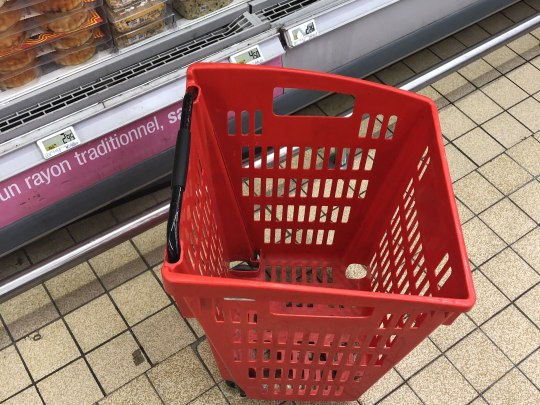
The grocery store, Carrefour, also had these shopping carts/baskets/basket-carts, which were really convenient
We quickly scurried back to campus with an armful of items because there is a bag tax here--plastic bags cost an additional 5 centimes. Most of the people in the checkout line were quite prepared with bringing their own reusable bags or just simply using an empty backpack, and at around 10am, we began our tour of campus.


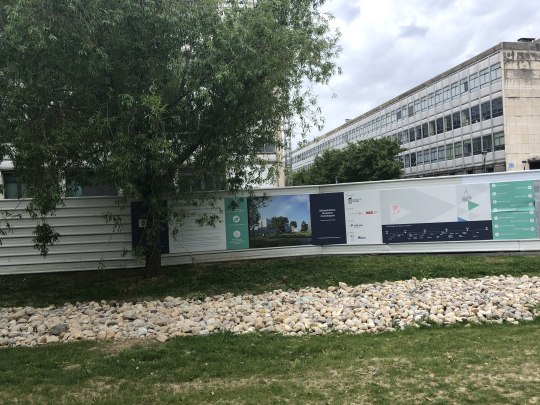
Not only were several buildings in the process of being renovated, but there was a bunch of construction along the roads, and preparations being made for a campus-wide event this weekend. It's almost like I never even left Ann Arbor 🙃 All of the buildings were of similar shapes and colors, with the main exception of a bright [Ross-]orange building that had a giant traffic cone in front of it.

there's a PokeStop for the cone in PokemonGo, and it’s dubbed the “VLC”, presumably in honor of the video streaming application
Once our tour and brief orientation session wrapped up, a couple other exchange students and yours truly briefly went to a mall in Part-Dieu to do some shopping.

Lyon has been coined one of the smartest cities in France, and the way tech has been embedded into facets of everyday life, like this funky tram map, has been cool to see. Now if only our dorm could have WiFi...
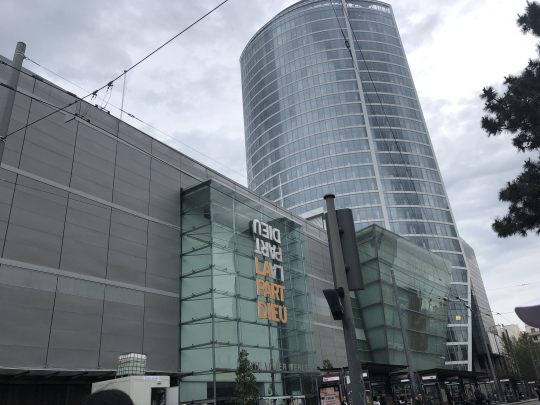

There were a couple familiar stores, mostly those that sold cosmetics. I specifically saw Sephora, M.A.C., L'Occitane, The Body Shop and I smelled also found a Lush store. I stopped by a tiny food stand to grab a quick bite to eat, and I thought I held the conversation in decent French, but upon getting my card back from the cashier and receiving my food, she said "Thank you" in English, which caught me by surprise. I was genuinely worried that my French was so bad she resorted to using English. When I had paid for my groceries in the morning, the card reader initially had a display in French ("Insert/Tap your card", "please wait", etc.), but the "Remove card" message was in English. Maybe there's something embedded in my card that somehow affects the language of the card reader? And maybe that’s how she knew I wasn’t French...
In the afternoon, we had a cooking demonstration + apéro* planned from 2:30pm through about 8pm. An English teacher at INSA joined us for the spectacle in order to translate instructions and general comments that chef Dominique had made. We helped peel some asparagus, but after that point, chef Dominique and his assistants took care of the rest (with the exception of one student volunteer piping the whipped cream on the strawberries).


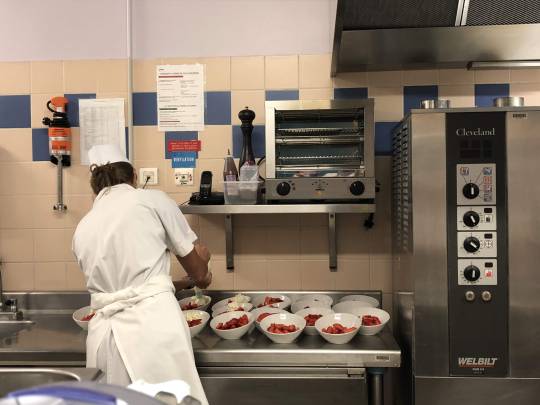

The menu for tonight consisted of:
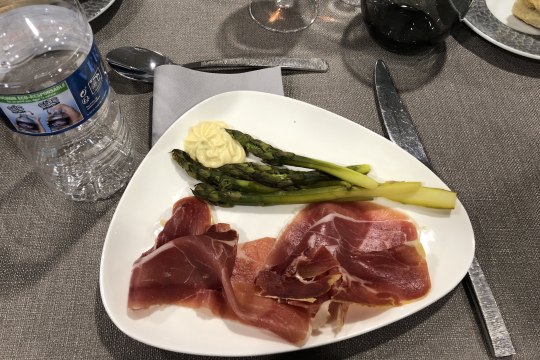
cured ham, asparagus, and some very-well seasoned mayonnaise/hollandaise sauce

broccoli, small potato pancakes, and duck served with a vinegary-orange duck-based sauce
some cheese (I didn't take a picture of this, but I assure you, you will see a lot more photos of cheese)

freshly cut strawberries that were macerated with sugar
That was all happened Friday, and next up: Vieux Lyon (Old Lyon--a very beautiful, colorful, historic, and cobblestony part of Lyon about 20-25 minutes away from campus)
a+,
Christina
Computer Science
Entrepreneurship with INNOV@INSA
Lyon, France
Two fun facts because I forgot some in my last post, thanks for sticking around:
"prendre l'apéro" - "to have an aperitif" is the literal translation, where an "aperitif" would typically refer to a drink consumed before a meal, but this was a whole ordeal where we had some kir, savory finger food, and of course, the food that we watched the chefs prepare in the kitchen. It was delicious, so far, I've been fairly impressed with the food here, and Lyon is living up to its name as the gastronomic capital of France.
AND
Most, if not all, plastic water bottles I've seen with the smaller caps snap open/close, instead of being a screw top. This is supposedly an intentional design to prevent the caps from getting completely lost, and the Carrefour store also had several different kinds of recycling bins, including one dedicated to bottle caps. It’s interesting to see this much consideration toward bottle caps, now if only I could find a recycling bin on campus...😬
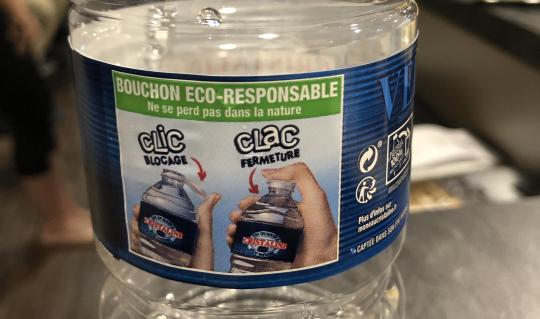
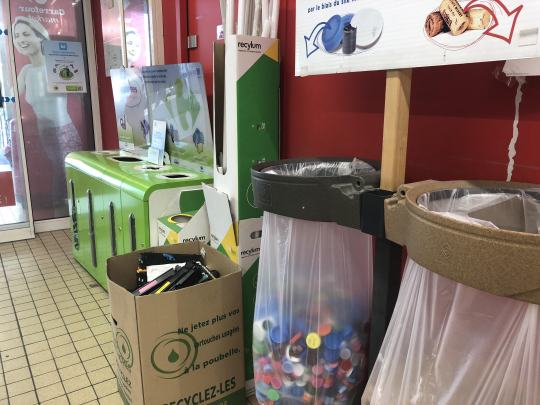
1 note
·
View note
Text
Arriving in Lyon
The 30ish hours from May 15th 6 9am EST/3pm CET (Central European Time) through May 16th 4pm EST/10pm CET were the most exhausting 30 hours of my life. I set my alarm for 6am because I (foolishly) thought that would give me enough time to take care of everything I needed to take care of before I left for 5 weeks. Spoiler alert [quite literally]: it was not enough time, I ended up sleeping in until 9am, and I only later realized I had left my milk in the fridge, so I'm in for a lovely surprise when I return.
At 11:32am, I left from the Ann Arbor Amtrak station toward Chicago Union Station, and the time it took me to finally arrive at the airport extended by about a full hour because of train delays on both the Amtrak and the Blue Line from Union Station to O'Hare. 🙃But then my flight out of the states was delayed by two hours, so I guess it all worked out...?

This particular 8-hour flight (or 10-hour flight, if you include sitting around for two extra hours) could have gone better, I sat next to a baby that constantly cried, so I didn't get much sleep. But at least this meant I was awake for our two in-flight meals, and handful of other snacks. The in-flight entertainment system had this fun tiny remote, and I didn't realize the lightbulb button was to control the seat light (I assumed it was to adjust the brightness or something) so my poor seatmates had to deal with that nonsense in the dead of night.

Once we landed, it was just a matter of getting to Lyon. I thankfully didn't deal with any more delays, and instead I just wandered around Charles de Gaulle for several minutes to figure out where my train arrives, only to learn the specific platform isn't announced until just before the train pulls into the station. I boarded a OUIGO train, which was decked out in bright pink and blue colors, and then dozed off as we traveled through the French countryside from Paris to Lyon.


I probably saw more cows in this particular train ride than I have in my entire life, which certainly makes sense given the country's fondness for cheese.
I found the architecture at St. Exupery--the train stop a short ways outside of Lyon proper--to be quite beautiful. I had two more transfers left before arriving at the campus, one onto the Rhonexpress, just a short shuttle/tram service between Lyon Part-Dieu and St. Exupery, and then one on the city's tramway from Part-Dieu to INSA.


At about 5:30pm CET (11:30AM for the folks back home) on May 16th, I settled into my rudimentary room. There's no WiFi in the dorms, but there are ethernet ports and we also got basic blankets and pillows. There was a fair amount of storage in the room, with drawers underneath each bed, a closet right next to the door, and even a weird ceiling basket in case you need to stow away even more things. A tiny bathroom, an even tinier kitchen with an itty bitty fridge and an absolutely miniscule icecube tray.





I was also greeted with this little sign on the toilet:

Which translates to: "Where are you going to be next year?"
"Back home with mom and dad", if you flush using more water, or "At INSA", if you flush using less water. This certainly reminded me of some of the toilet handles I’ve seen on campus at Michigan, but this featured a lot more guilt-tripping.
By about 7pm, almost everyone from the study abroad program had arrived, and we got to meet some of our INSA buddies! We were all paired with a student studying at INSA to help us get a lay of the land (e.g. apparently the on-campus eateries are only open during normal meal hours, so goodbye 3pm lunches and 9pm late night snacks). We spent the rest of the evening eating at a burger place near the campus, I tried to order my food in French only to realize I didn't properly understand the various options that my meal came with, so I enlisted a buddy for some help translating (and ultimately: for some help ordering as well). When it was time to pay, we went to the register on our way out--which was a bit unusual, I've never had to do that at a bar or sit-down restaurant back at home--and then we all parted ways for the night.
So much had happened in my last day in America/first day in France, and this was only just the beginning. Our classes don't start until Monday, and the time in between is dedicated to various campus/city/French activities. I'm writing this particular post 2 days later (obviously), so coming up soon are stories and pictures of the historic parts of Lyon.
a+,
Christina
Computer Science
Entrepreneurship with INNOV@INSA
Lyon, France
1 note
·
View note
Text
School, Home, Then School Again
I can’t believe I’m already leaving for Spain tomorrow. My last final was two weeks ago now, and I remember being extremely relieved and ready to just relax while I overdosed on Netflix for the next two weeks. I just finished up packing and all my stuff is almost ready to go. It’s harder than you’d think, figuring out how to pack for six weeks on a different continent. But, I think I did well. Everything fits in two suitcases!


I spent the past two weeks begging my friends to hang out with me as they slowly made their way home, one by one. I haven’t seen any of them since December, and I won’t see most of them until I come home again in June. In the past two weeks, we managed to: hit our favorite late-night fast food place, go to our favorite ice cream place where one of my friends works, grab breakfast at the diner, and make many Tik Toks (which may be the new Vine, we’ll see), watch two movies, and go through a season or two of Friends on Netflix. Time well spent if you ask me. I’m going to miss them while I’m away, but I guess that’s why WhatsApp has facetime.
I’m going to miss my family, too. I made them all download WhatsApp so I could talk to them. I plan on facetiming in almost every day, if only to see my dog, Oakley. Look how cute he is!

I am incredibly excited and only slightly nervous for this trip. I just don’t really know what to expect. I know I can’t wait for the beach. San Sebastián is known for the famous Bahía de la Concha.

I’m looking forward to getting to know everybody on the trip. We all met once at our orientation, and we’ve been in touch in a GroupMe, but we have had much face-to-face time. I’m pretty sure our first few days are meant to let us get to know one another, so that’ll be a lot of fun. As soon as I get one, I’ll be sure to include a group picture.
Ryan DaCosta
Undeclared
Spanish Language, Culture, and Industry in San Sebastián, Spain
1 note
·
View note
Text
I’m Sorry, but I Can’t Leave Portugal Yet
Well, it’s official - this year’s European Innovation Academy, Portugal, has come to a close. I’m sitting here on the couch typing this blog post, and I can’t begin to even put into words how it feels to know that I may never again see many of the incredible friends I have made on this trip. I am hopeful, however, that we will stay in contact - after all, what else is the internet good for? It’ll be strange to adjust back to work and school, but I’m sure even years from now I will look back at these amazing memories and smile.
The last few days of the event passed in a blur, and ended in a truly spectacular manner on Friday with the Grand Pitch followed by the awards ceremony. My team, Aegis Systems, had the honor of being one of the five finalists for the Quinones Team Spark Award from Nixon Peabody. While we didn’t end up winning the award, being recognized at the award ceremony as a finalist was still a wonderful experience.
To my teammates and my mentors, thank you for all of the help and patience you’ve exhibited in these past three weeks. Things got tense, plans fell through, tempers flared, but that’s to be expected when you spend 10+ hours each day working together. It’s the way that we never faltered in pursuing our goal, never gave up, never quit, and always forgave each other that leaves me with a sense of pride in our accomplishments. I have no regrets at all, and I would not choose anyone else to have shared this start-up experience with. I love you all so so much.


A few pictures with my amazing Design Mentor, Zara, my team member Sara, and my wonderful IP mentor, On.
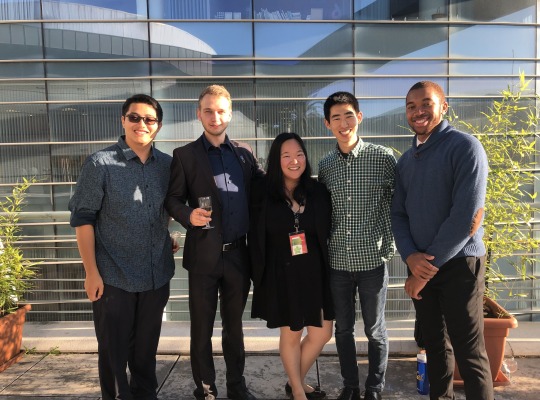
A few friends and I after the awards ceremony. Pictured: Calvin, Oskar, Emily, myself, and Darel.
The last weekend was a whirlwind of activity, with goodbyes and adventures still to be had. On Saturday, a few of the University of Michigan students and I traveled to Evora, Portugal to wander and take in some of their famous sites (mentioned in literature like Percy Jackson, Dan Brown books, and even the 39 Clues, if I’m not mistaken). We visited the Temple of Diana, the Chapel of Bones, museums, Roman era aqueducts, and so much more.




Pictures of the beautiful sights in Evora, Portugal.
On Sunday, we roamed through Lisbon, bought pineapple pina coladas, flower shaped ice cream, and souvenirs to remember our time here. Then we traveled to Belém to eat lunch and visit the famed Banksy exhibit, which boasted many Banksy originals. We also visited the monument to Columbus, and even the Christ the King statue (from a distance)! Finally, we traveled back to Lisbon to eat dinner and walk around one last time with a couple of our phenomenal and cool and amazing friends from the program. It was an emotional and raw night, without a doubt.
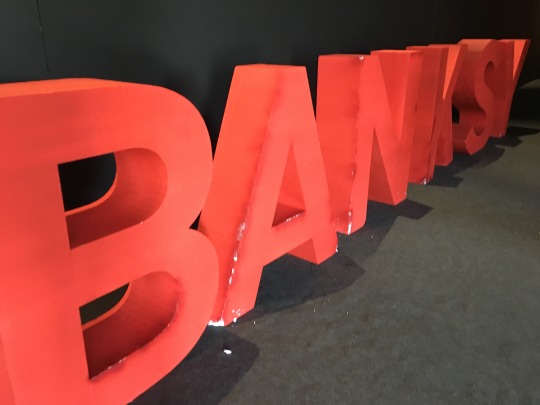
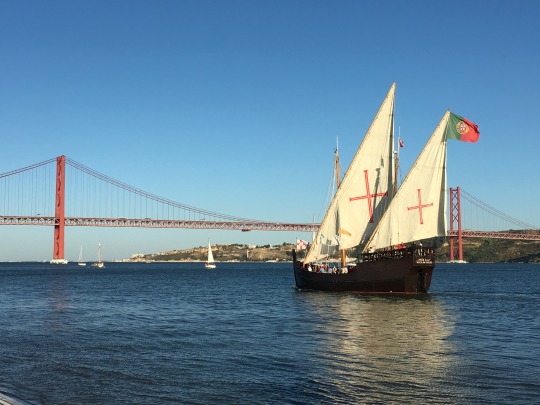

A few famous Belém monuments, alongside the entrance to the Banksy exhibit.

A final dinner, with friends I will never forget.
I’ll leave you all with some takeaways and tips that I wish I had known before I left for the program. Take what you will from them, but I hope they are helpful. To those enrolling in this program next year, good luck and don’t forget to enjoy yourself.
1. Choose a team based on the people. Your idea WILL change, you will pivot so many times that your final idea may have absolutely nothing even remotely resembling your original idea. The people on your team won’t change - the smallest things that you notice on that first day? The littlest things at annoy you? After three weeks of 10 hour days, you will hate those little things with a burning passion. But also know that everyone has quirks, and no matter who your team is, you will argue, and disagree, and fight, but the hallmark of a truly great team is one that always makes up and never puts each other down.
2. If your team does have conflict (and it will), trust me and talk it out right away. Don’t leave your problems to fester, and if need be, they have life coaches for a reason. It will be uncomfortable to the extreme, and every fiber of your being may wish not to bring your conflicts out in the open, but it will make your team stronger (and you happier) if you do it. Tears may be shed, voices may be raised, but the outcome is worth it.
3. Be willing to bend and to compromise. Know that your teammates are intelligent and will approach problems differently than you do. Don’t discount anyone’s ideas and just keep an open mind.
4. Try to be outgoing and to meet lots of new people. It can be really daunting, but the friendships you forge are, in my opinion, worth it a million times over.
5. Don’t discount your own skills. Be confident in yourself and what you can accomplish, but also don’t ignore your weaknesses. An amazing mentor once mentioned that the people around us are our mirrors - look to them and you might just see parts of yourself, good and bad, that you didn’t see before.
6. Cherish your friends while you can. You may never see many of these people again, so make the most of your time with them. Of course, don’t lose touch afterwards! Friendships will endure if they are truly strong, and I believe many of yours will be, as mine became, are.
A few more housekeeping things:
1. Bring at least two electrical adapters. Don’t forget! Europe does not use the same plugs as the US, and you will need to charge many things.
2. Water is a precious commodity in Portugal, and drinking fountains are a rarity. At the supermarket (I would recommend any Pingo Dolce), buy water in bulk (a one or two gallon bottle). It is cheaper by far and you will need it to fill your water bottles for the weekends and at night. However, do know that at least this year, the Congress Center did have a drinking fountain.
3. Water costs money at restaurants, and quite a bit at that. Don’t go into any restaurant and expect to get water for free when you ask for “water”. Ask for tap water specifically, or bring your own water. However, there is also nothing wrong with just buying water from restaurants either!
4. Go out on the weekends to see the sights! I would recommend a day trip to Lagos, and a weekend for Porto. Cascais, Lisbon, and Belém are beautiful. And Sintra is a stunning place, and my #1 recommendation. At least two full days can be spent there to see all the sights.
5. Good luck and have fun! If you have questions, don’t hesitate to reach out to me :)
Onwards and upwards! But of course, I will never forget this experience or the amazing friends that I have made.
Kevin Wang
Computer Engineering
European Innovation Academy in Cascais, Portugal
0 notes
Text
Weekend Vibes
Back to my studies tomorrow, but for now I’m soaking in the last few hours of my brief break. Inevitably the weekend comes to an end, and I’m steeling myself for the coming week of the European Innovation Academy. Last week saw my chief mentor (the wonderful Alina Adams) and marketing mentor (the incredible Kerstin Raitl) heading home. While I’m saddened that they are leaving, I’m incredibly grateful for the mentorship, friendship, and life advice that they shared with me these past weeks. Kerstin and Alina, thank you :). Next week comes the final sprint for the finish line, beginning with IP protection and ending in the grand pitch. Naturally, I’ve hoping beyond hope that my team becomes one of the ten finalists that have the opportunity to participate in the Grand Pitch Finale on Friday. Knock on wood.
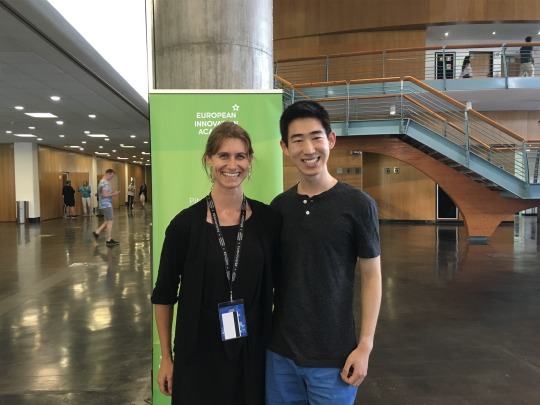
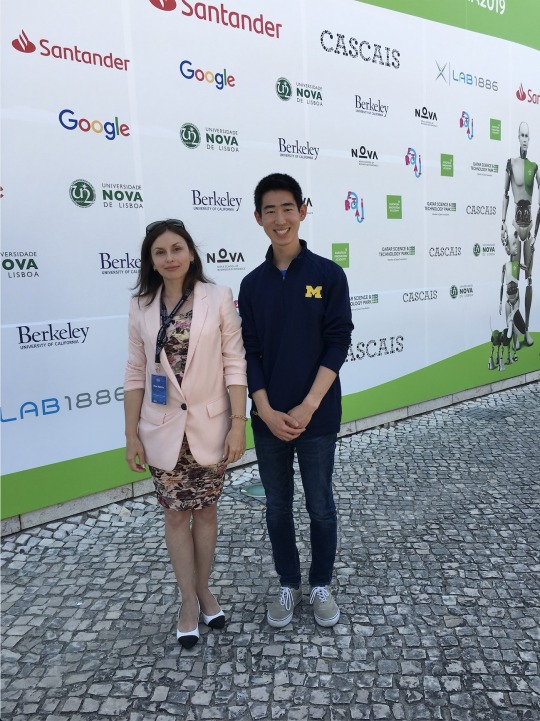
My mentor Kerstin and I, and my mentor Alina and I, respectively.
I’m going to take this opportunity to shamelessly plug my start-up, Aegis Systems. We are designing wearable IoT vital sensors to provide protection to police, firefighters, and workers by monitoring vital signs and alerting supervisors and the authorities to any signs of duress or harm. In order to progress to the investor pitches, we need 500 people to show interest in our start-up, so if this sounds like something that is interesting or cool, please visit our website, scroll to the bottom, and sign your name and email! Website: https://katshuadventures.github.io/AegisSystems/.
The notion of being in Portugal is sometimes incredibly hard to grasp, and then other times the differences hit like a truck barreling down the freeway. Tasks like waking up in my dorm room, eating a hasty breakfast, and walking to class all seem so mundane. Interspersed within my daily routine, however, I’ll see an intricate trellised garden, or a beautiful fountain, sometimes even flocks of seagulls swooping through the morning sky and it’ll strike me that I’m standing in a foreign country, among history thousands of years old. This entire weekend has felt that way, almost like wandering through a dreamscape.
Visiting Lagos, in particular, this past weekend was an experience unlike any other I’d had before. After waking up in the wee hours of the morning, navigating the labyrinth of the train station, and napping through a four hour train ride, we finally reached Lagos. First impression? Very underwhelming - the buildings were small, the streets cobbled, all in all, just a miniature Lisboa. Frankly, I was wrong. The train station, nestled in the center of the city, hid the ocean from view, which is what makes Lagos a true beauty. We took a two and a half hour guided kayak tour along the coastline, traveling through stunning arches of sandstone and secret caves. Then, stopping at a beach accessible only by kayak, we went snorkeling alongside the other groups of kayakers. After spending the rest of the day perusing through tented souvenir shops, visiting churches and monuments, we departed by bus back to Lisboa.


The famed sandstone arches of Lagos, Portugal.

Pictures from the kayakers beach.

The Lagos Crest, located along the beachside.

Sunset on the bus ride (only ten people booked the bus!) back to Lisboa.
A short aside dedicated a prominent feature I’ve noticed throughout Portugal: graffiti. From crude drawings (of the sort I’m sure you can imagine), to intricate works of art, every bit of concrete in Portugal seems to be tagged with graffiti. How important this is, I am unsure, but I thought it was worth noting.



A few of the many graffiti artworks in Lagos.
Sunday (today for me!), was a day chock full of activity and wonder. The Palácio de Monserrate in Sintra was our first stop, and we set off in an Uber ready to tackle the day. Thirty minutes into what should have been a twenty minute ride, we were on edge. Forty minutes in, and we began to ply our Uber with questions as to the problem. Fifty minutes in, and we were officially lost. Luckily, Google Maps came to the rescue, and by the end of the hour, we finally pulled out in front of the lawns of the Palácio de Monserrate. For almost two hours, we wandered through the vast gardens planted centuries ago, moving from the Mexican Garden to the Rose Garden to hidden waterfalls, to a ruined chapel. The grounds of the estate were immense, and every inch was filled with flora bewilderingly beautiful, with bees, butterflies, and lizards aplenty. Choosing, of the two thousand photos I took, which to post here may have been the hardest decision I’ve made on this trip.



The gardens of the Palácio de Monserrate in Sintra, Portugal.


The University of Michigan students conquering the ruined chapel.
Then, after hours of wandering, the Palace came into view beyond rolling green fields. It was magnificent. The outside influences on the palace were obvious, from Roman busts to tiled walls. In words, I’ve no clue how to convey the sense of glory of the palace, so I hope that pictures are sufficient. Also, to the couple whose wedding was taking place in the palace - congratulations! I cannot imagine a more magically location to tie the knot.





Photos of the Palácio de Monserrate.
Next, to finish off the day our group split, and two friends and I traveled to Quinta da Regaleira (a UNESCO World Heritage Site!!). The estate is settled right alongside Sintra, bordered by busy streets and cars. However, the minute we stepped through the gates, the sounds of the city faded, hidden by the towering walls surrounding the property. We first made a beeline for the Inverted Well, one of the gems of the property- a “well” that snaked floors under the ground that was used by the Knights Templar as the location for their initiation rituals. Then, we explored the grottoes, fountains, exquisite constructions, towering spires, teeming vegetation, and, of course, the palace and chapel. In my opinion I loved the gothic towers, mysterious green moats, and crumbling dark wells and tunnels a bit more than the beautiful and graceful Palácio de Monserrate. While the Palácio de Monserrate estates could have been a fairy castle, the Quinta da Regaleira estates stepped straight out of a fantasy book - a dark villain’s haunting grounds and looming towers. My favorite place on the estate? The path of the gods - the path leading to the palace lined with marble busts of the Roman gods. 10000/10 would recommend.

The Initiation Well of the Knights Templar at the Quinta da Regaleira.

The Palace at the Quinta da Regaleira.





More from the Quinta da Regaleira.
Onwards and upwards, as they say!
Kevin Wang
Computer Engineering
European Innovation Academy in Cascais, Portugal
0 notes